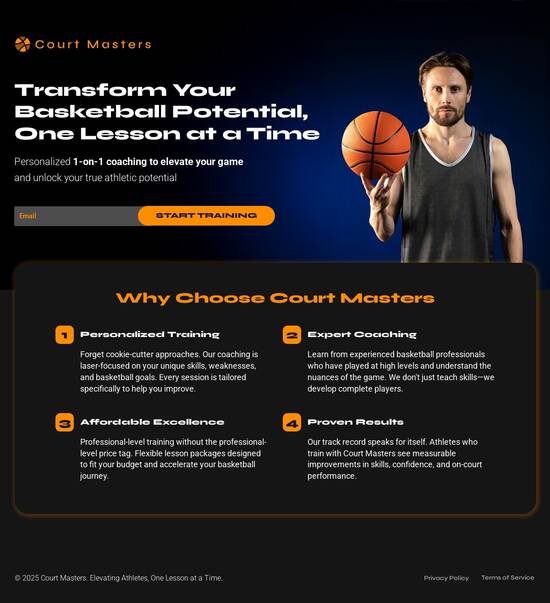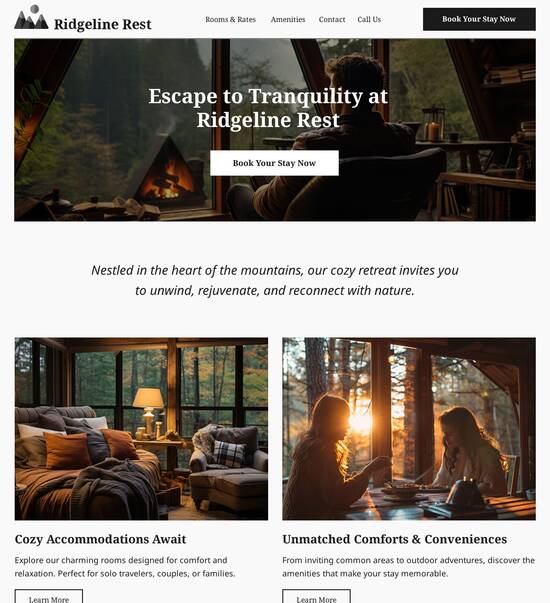
HTML page template for paper mills
Use TemplateAbout template
Engage your audience like never before with stunning landing page templates for paper mills. Make your online presence unforgettable!
Recommended templates

Easy to build without coding
With the intuitive drag-and-drop builder, anyone on your team can create high-converting pages without any knowledge of code or design. Make enhancements to your landing page with custom widgets using Javascript, HTML/CSS, or third-party scripts.

Multiple layouts for any industry and goal
Select from 500+ landing page layouts built to boost conversions across industry-specific scenarios. Customize them by adjusting fonts, adding images, and generating on-brand content with the AI assistant. Quickly scale with Instablocks® and Global Blocks that you can save, reuse, and update globally.

Loads fast and looks polished on any device
Every template is responsive, which means they present professionally on any device and load blazingly fast with our Thor Render Engine. You can also power them up with Google AMP technology to deliver an unparalleled mobile experience and drive higher conversions.

Robust analytics & experimentation
Get real-time updates and reporting across all your devices, showing the number of visitors, conversions, cost-per-visitor, and cost-per-lead. Launch AI-powered experiments, run A/B tests, and use heatmaps to analyze user behavior, then optimize your landing page to maximize conversions.







Easy to build without coding
With the intuitive drag-and-drop builder, anyone on your team can create high-converting pages without any knowledge of code or design. Make enhancements to your landing page with custom widgets using Javascript, HTML/CSS, or third-party scripts.
Multiple layouts for any industry and goal
Select from 500+ landing page layouts built to boost conversions across industry-specific scenarios. Customize them by adjusting fonts, adding images, and generating on-brand content with the AI assistant. Quickly scale with Instablocks® and Global Blocks that you can save, reuse, and update globally.
Loads fast and looks polished on any device
Every template is responsive, which means they present professionally on any device and load blazingly fast with our Thor Render Engine.
Robust analytics & experimentation
Get real-time updates and reporting across all your devices, showing the number of visitors, conversions, cost-per-visitor, and cost-per-lead. Launch AI-powered experiments, run A/B tests, and use heatmaps to analyze user behavior, then optimize your landing page to maximize conversions.
All the features you need to build lead-generating landing pages
Explore more featuresLearn how to build top-performing landing pages for any goal
FAQs
Leading the way in building high-performing landing pages





An effective landing page strategy with Instapage
Creating high-converting landing pages is essential for marketers aiming to maximize their ROI. With Instapage, businesses can quickly design and implement effective page solutions to accelerate their digital campaigns. This guide walks you through the steps needed to harness the full potential of Instapage.
Understanding Instapage
Instapage is an all-in-one landing page and conversion rate optimization (CRO) platform that streamlines the process of creating landing pages. Featuring a diverse library of over 100 templates, marketers can build engaging and conversion-focused pages in minutes, no coding required. This flexibility empowers teams of all sizes, whether in education, tech, financial services, or any other vertical, to focus on what matters—driving results.
- Ease of use: Instapage features an intuitive drag-and-drop builder that allows users to design pages without technical skills.
- Customization: Instapage offers robust customization options, ensuring that every page aligns with brand identity.
- Integrated analytics: Track performance metrics in real-time, optimizing campaigns for better results immediately.
Step 1: Create your landing page
To get started, log in to your Instapage account and select a template that aligns with your campaign goals. You can follow these simple steps:
- Select a template that fits your industry and marketing objective.
- Customize the design with your branding, images, and text to ensure it resonates with your target audience.
- Utilize Instablocks, which are reusable content blocks, to speed up the design process.
Step 2: Optimize for conversions
After setting up the landing page, the next step focuses on optimizing it for higher conversions. Here’s how to refine your page:
- Conduct A/B testing to identify which elements perform best, such as headlines or images.
- Use heatmaps to analyze visitor behavior, adjusting layouts based on user interactions.
- Incorporate calls-to-action (CTAs) strategically, encouraging users to engage with your offer.
Step 3: Personalize and collaborate
To ensure your landing page reaches its full potential, personalization and collaboration with your team are necessary steps:
- Utilize dynamic text replacement to tailor the landing page content based on user data from ads.
- Collaborate with team members and stakeholders in real-time through Instapage's sharing options for more efficient feedback.
- Implement feedback loops to continually improve the page based on initial campaign results.
By following these steps, you can create, optimize, and personalize effective landing pages that drive results.
Start leveraging the powerful features of Instapage today. Take your marketing campaigns to new heights with expertly crafted landing pages!
People also ask about HTML page template for paper mills
Understanding HTML page templates for paper mills: a modern era approach
The evolution of paper mills in the digital age
The journey of paper mills from their traditional roots to a more modern, digital approach provides context for understanding the need for HTML page templates. In 2007, paper mills primarily focused on operational efficiency and production capabilities. They relied heavily on brick-and-mortar sales strategies and traditional marketing channels, often finding it difficult to reach a broader audience. As the digital landscape began to take shape, many in the industry underestimated the seismic shift that would follow.
Fast forward to 2025, and the scene has transformed significantly. Paper mills have not only adopted e-commerce platforms but also integrated a variety of digital marketing tools that enable direct customer engagement. Yet, these advances come with challenges, such as keeping pace with the rapid technological changes and addressing consumer concerns regarding sustainability.
Historical context of paper mills in pre-digital era.
Transition to innovative practices by 2025.
Key elements of an effective HTML page template
An effective HTML page template for paper mills combines structure, design, and performance to create an engaging user experience. The visual appeal is paramount; a well-crafted CSS design enhances usability and guides user navigation intuitively. Implementing a responsive layout ensures that whether the user is on a mobile device, tablet, or desktop, the website retains its integrity and optimizes user interaction.
In tandem with aesthetic considerations, performance optimization is critical. A fast-loading web page avoids frustrating users and enhances retention rates. Utilizing lightweight images and resource optimizations can greatly contribute to improved load speeds. Meanwhile, semantic HTML features such as properly designated headers, lists, and footers serve to improve accessibility, which is a growing concern in web design.
Importance of clean CSS design for enhancing user experience.
Creating responsive layouts to cater to various devices.
Unique features of paper mill HTML templates
HTML templates specifically designed for paper mills offer unique features tailored to their industry needs. Customizable layouts allow for the integration of different product sections, showcasing various paper types, grades, and applications. This flexibility is vital for catering to diverse customer needs, enabling mills to display specialized offerings without complicating the design.
SEO optimization is another critical feature built into these templates. Incorporating XML sitemaps is essential for search engines to effectively index each page, while meta tags and structured data ensure enhanced visibility in search results. Additionally, advanced privacy features address compliance regulations like GDPR, which became critical post-2021, ensuring that user data handling aligns with modern legal standards.
Customizable layouts for specific product showcases.
SEO optimizations for better search visibility.
Benefits of implementing HTML page templates
Utilizing HTML page templates redefines the development process for paper mills, streamlining workflows and reducing design time. Pre-defined layouts facilitate quick deployment, allowing businesses to focus resources on content quality and marketing strategies instead of fundamental design elements. Additionally, code snippets included in templates allow customization without from-scratch programming. This productivity boost is particularly crucial for smaller mills looking to maintain competitive leverage.
Enhanced user engagement is another significant advantage. Templates have built-in interactive elements that promote user retention, such as product reviews, dynamic galleries, and contact forms. Engaging users not only keeps them on the page longer but also aids in gathering valuable data through analytics integration, enabling mills to track consumer behavior and preferences.
Streamlined development process saves time and resources.
Increased user engagement through interactive elements.
The impact of HTML templates on SEO and marketing strategies
Effective SEO begins with structured content and headers built into HTML templates that guide search engines in understanding the site’s hierarchy and relevance. A well-organized XML sitemap facilitates smooth indexing by search engines, helping paper mills gain traction in a competitive digital market. Not only does this structure enhance search engine visibility, but it also opens doors for backlinking opportunities, vital for improving domain authority.
Beyond search engines, local SEO plays an increasingly pivotal role in driving foot traffic to physical mill locations and spreading awareness of their digital presence. Coupled with social media integration, these templates create a comprehensive marketing ecosystem, allowing mills to reach broader audiences while fostering greater community engagement.
Structured content improves visibility and SEO effectiveness.
Local SEO and social media integration extend market reach.
Challenges and considerations in template customization
While customizing HTML page templates is beneficial, it is crucial to strike a balance between unique features and performance. Over-customization can lead to bloated code, significantly affecting load times and user experience. The goal should always be to enhance usability while maintaining speed and functionality. Testing is essential in this process to ensure that the page remains swift and responsive across devices.
Keeping updated with industry standards is another challenge that paper mills must navigate. Regular updates are not merely beneficial; they are necessary to comply with evolving regulations and user expectations. As trends shift from 2007 to 2025, being prepared to adopt new technologies and methodologies becomes paramount for maintaining a competitive edge.
Balance between customization and performance is vital.
Regular updates ensure compliance with industry standards.
Future trends in HTML templates for paper mills
As the digital landscape continues to evolve, emerging technologies like AI and machine learning are likely to influence HTML templates for paper mills, enhancing user experiences through personalized interactions and streamlined user interfaces. By 2025, advancements in user experience design will result in more intuitive interfaces, fully equipped to meet the changing expectations of consumers who are now accustomed to highly interactive digital environments.
Additionally, there will be a heightened focus on sustainable practices, not only in paper production but also in digital asset management. As users become increasingly aware of their environmental footprints, paper mills must reflect these practices in their digital strategies, adapting HTML templates accordingly to highlight sustainability initiatives and transparent practices.
AI and machine learning are set to transform user interfaces.
Sustainability will increasingly impact digital strategies.
Real-world examples: success stories of HTML template utilization
One notable case study is a well-established paper mill that faced challenges in modernizing its online presence. Initially stuck with an outdated site, they opted to implement HTML templates tailored for their brand. The transition led to improved aesthetics and functionality, resulting in a 40% increase in website traffic and a notable uptick in inquiries.
In another instance, a burgeoning paper mill leveraged HTML templates for brand expansion. By employing templates that allowed for rapid customization and integration of multimedia, they expanded their reach significantly. The metrics showed an impressive 50% rise in conversions, facilitated by a streamlined user journey and improved brand visibility. These success stories underscore the transformational power of HTML page templates.
Case study showcasing a paper mill's successful transformation.
Brand expansion through effective use of HTML templates.
Resources for building and customizing HTML templates
For those looking to dive into creating HTML templates, a plethora of tools and frameworks simplify the process. Popular CSS frameworks like Bootstrap and Tailwind CSS provide robust, responsive design options that can be tailored for specific needs. These facilitate the creation of attractive, functional layouts with minimal effort, making them ideal for paper mills looking to modernize.
Additionally, selecting the right code editors can enhance productivity. Editors such as VS Code and Sublime provide features geared towards web development, helping streamline the coding process. Coupled with active online communities and forums like GitHub and Stack Overflow, developers have access to a wealth of shared resources, tutorials, and innovative ideas specifically focused on HTML and CSS.
CSS frameworks like Bootstrap and Tailwind for layout design.
Recommended code editors including VS Code and Sublime.
Ready to skyrocket conversions?
Supercharge your ad campaigns with high-performing landing pages
Get started














